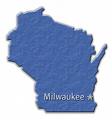Hope for the Milwaukee Transportation Money?
 Earlier this semester, our Distinguished Fellow in Law and Public Policy, Mike Gousha, held an “On the Issues” session with Milwaukee County Executive Scott Walker and Milwaukee Mayor Tom Barrett regarding how to spend the $91.5 million in federal funds earmarked for transportation needs in the region. A brief history on the money: More than seventeen years ago, the federal government set aside $91.5 million to be used for transportation projects in the Milwaukee region. Since that time, the City and County of Milwaukee have been unable to reach an agreement as to how to use those dollars. As a result, the $91.5 has sat unused — earning no interest to boot.
Earlier this semester, our Distinguished Fellow in Law and Public Policy, Mike Gousha, held an “On the Issues” session with Milwaukee County Executive Scott Walker and Milwaukee Mayor Tom Barrett regarding how to spend the $91.5 million in federal funds earmarked for transportation needs in the region. A brief history on the money: More than seventeen years ago, the federal government set aside $91.5 million to be used for transportation projects in the Milwaukee region. Since that time, the City and County of Milwaukee have been unable to reach an agreement as to how to use those dollars. As a result, the $91.5 has sat unused — earning no interest to boot.
As part of my Legislation class, I required my students to attend some of the “On the Issues” programs this semester (as an aside, Gousha and his programs are an inimitable complement to the teaching and scholarship engaged in at the Law School — more on that perhaps some other time). One of my students emailed me recently pointing out that under President-elect Obama’s public works economic stimulus plan, states that do not expediently invest their federal highway and transportation money will lose it (the classic “use it or lose it” approach). Another sidebar here: It warms a professor’s heart to receive such emails and see his/her pedagogical theories validated, at least to some degree.
My student went on to point out that the partisan bickering between Walker and Barrett — indeed, the seemingly intransigent positions that have been staked out (see webcast and post) — may lead to the region losing a significant sum of money that could be used not only for transportation needs, but also for infusing some much-needed money into the local economy.
Last month, student guest blogger Andrew Golden posted about the issue of partisanship and whether it is a “poli-ticking time bomb.” Let’s hope that our local political leaders can end nearly two decades of political, if not partisan, bickering and find a productive and sensible way to use these federal dollars before they disappear.

